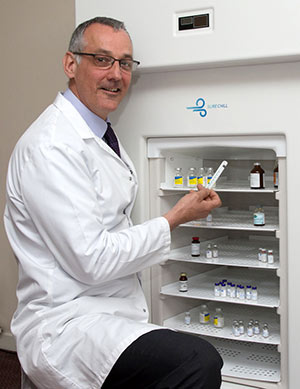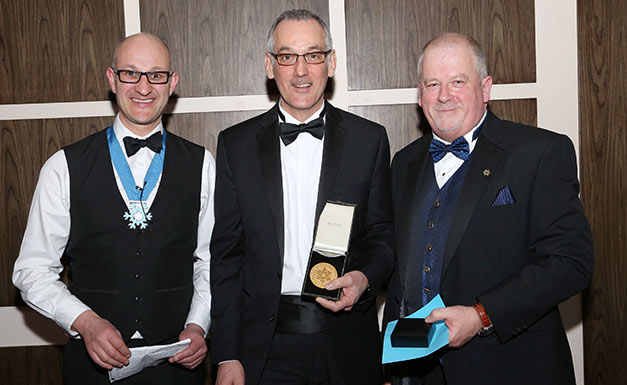Medal winner is refrigeration life saver
13th March 2016
UK: The winner of this year’s J & E Hall Gold Medal believes his new Sure Chill technology can help save the lives of millions of people in the developing world.
Up to 75% of vaccines in the poorest countries are currently being stored at temperatures below freezing, leaving them unfit for use by the time they are needed. The Sure Chill vaccine refrigerator keeps vaccines within a temperature range of 2°C to 8°C for 10 days or more without the need for a grid-based electrical supply.
The success of this water-based cooling technology saw Sure Chill’s chief technical officer and co-founder Ian Tansley being awarded the J & E Hall Gold Medal at last month’s Institute of Refrigeration annual dinner.
“Freezing renders much of the vaccine useless and, because of this, millions of people are missing out on key inoculation programmes,” explained Ian Tansley. “My mission is to remove this waste and by doing so protect people from life-threatening diseases. Sure Chill uses nature – and by that I mean water – to keep the products cool.”
The technology relies on water’s unique property that at 4ºC it is at its heaviest. At 4ºC it sinks. At any other temperature it rises. This scientific fact inspired the Sure Chill team to create a seemingly intelligent system that adapts its temperature naturally so it automatically cools to the optimum temperature: a constant 4ºC even without power.
Water surrounds a Sure Chill refrigeration compartment. When it has power, the water cools and forms ice above the compartment leaving only water at 4ºC cooling the contents. When the power is switched off, the water warms and rises while the ice begins to melt, keeping only 4ºC water cooling the contents of the compartment. The system can operate like this, without power, for days and weeks.
“This enables the refrigeration system to have incredibly high temperature tolerances and crucially provides a freeze-free environment,” said Ian Tansley. “Vaccines are sensitive to temperature and warmth is not good for them. If you get beyond the 2°C to 8°C band the vaccine doesn’t have too much effect on the people it is intended for. Take a vaccine below freezing and you are likely to loose its potency too.
“So, in developing countries you take your vaccine to your remote health post in one hand and take ice in the other. You put the ice and the vaccine in their separate compartments in the refrigerator. That ice is able to keep the vaccine at a perfect temperature even in high tropical temperatures.”
Simple idea
The idea for the technology came from the beautiful valleys of Wales where Ian lives, near the Snowdonia National Park. He explained: “I was walking past a frozen lake with a friend. I was trying to explain to him why there was ice on top and warm water underneath. I was describing how the warm water sitting beneath the ice is denser and that water is at its heaviest at 4°C. That’s when I had that Eureka moment. It came to me that I could use this principle in cooling.”
The company spent a long time converting a simple idea into a working technology. This meant years of building prototypes, changing one variable at a time and years of testing, perfecting and patenting.
Before Sure Chill, Ian was employed in the renewable energy sector and gained experience of working abroad. He discovered that power failures are common place in the developing world and many areas do not have any electricity supply. This is often where the vaccines are needed most to treat a number of life-threatening diseases affecting children like polio, diphtheria and whooping cough.
Sure Chill has already exported more than 3,000 water-chilled refrigerators to 38 countries across the world with each unit capable of storing enough vaccine to save the lives of thousands. He added: “You can say there are hundreds of thousands of people whose lives are being improved by this technology and we have barely started yet. This element of freeze-free vaccine control plays a significant role in primary medical care in the Third World.”
The technology can also be employed closer to home. The business is looking at ways in which it can keep drinks cool and be used in homes. Ian said: “To stop the lights going out in the UK we need to either build more and more power stations or find a way to manage the country’s energy demand. Sure Chill enables energy to be stored in every fridge in the country offering the National Grid enormous storage potential to enable them to balance the load.”
Being honoured with the J & E Hall Gold Medal, presented at the Institute of Refrigeration Dinner in London, was a proud moment for Ian. He said: “It’s absolutely fabulous to have won the award. I am humbled to have joined such an illustrious group of past winners during the 38 years of its existence. Names that have appeared on the list are legends in the refrigeration industry. I am delighted to have joined them.”








